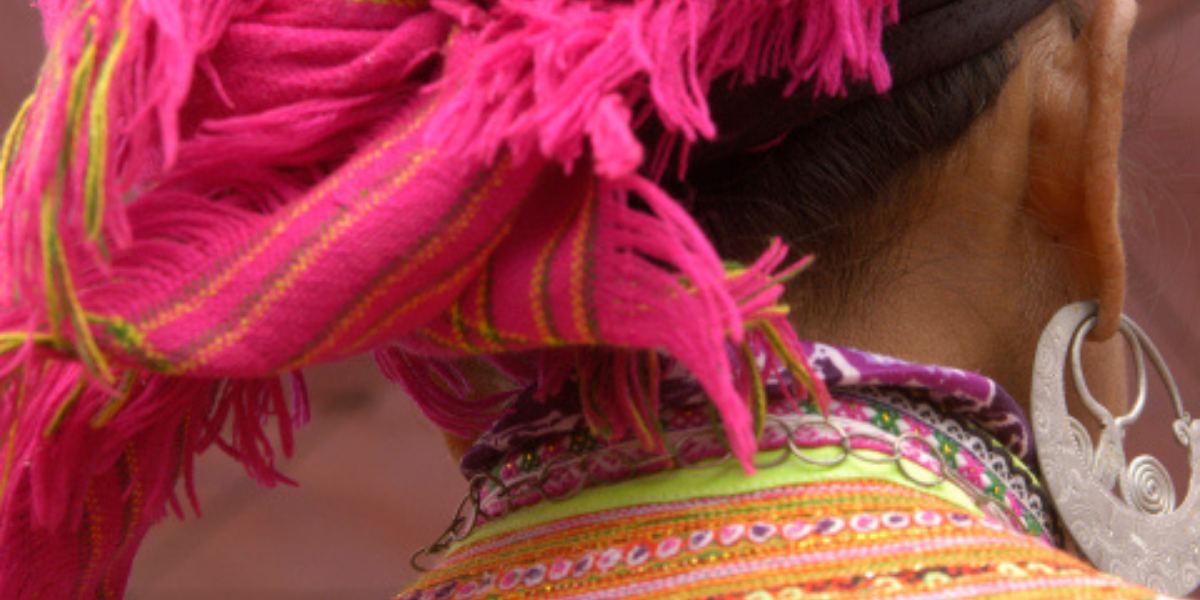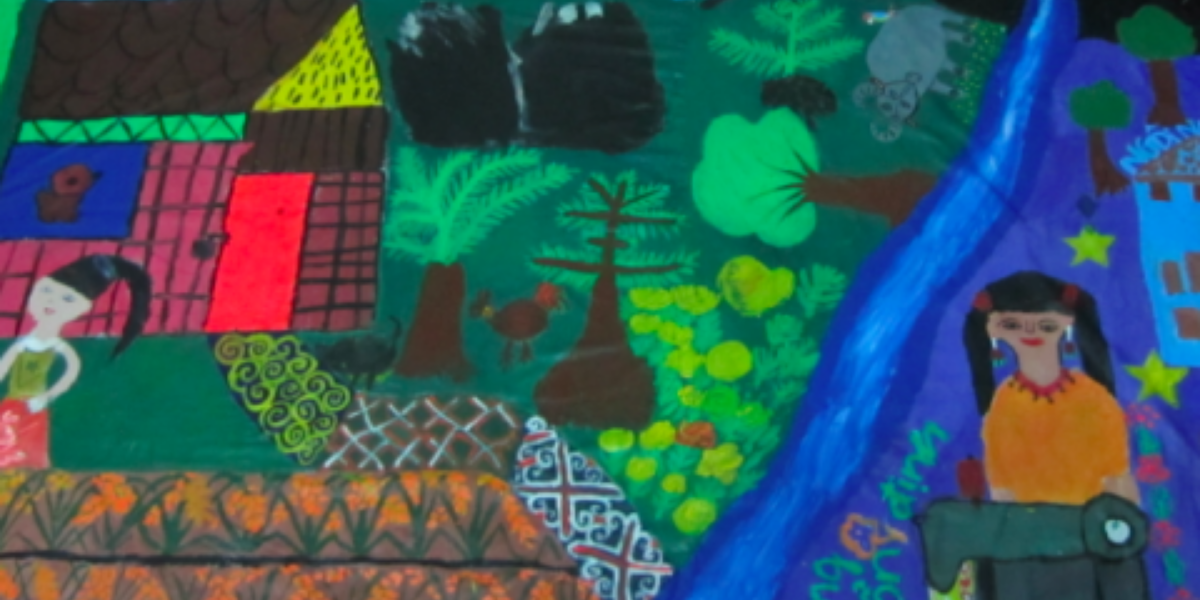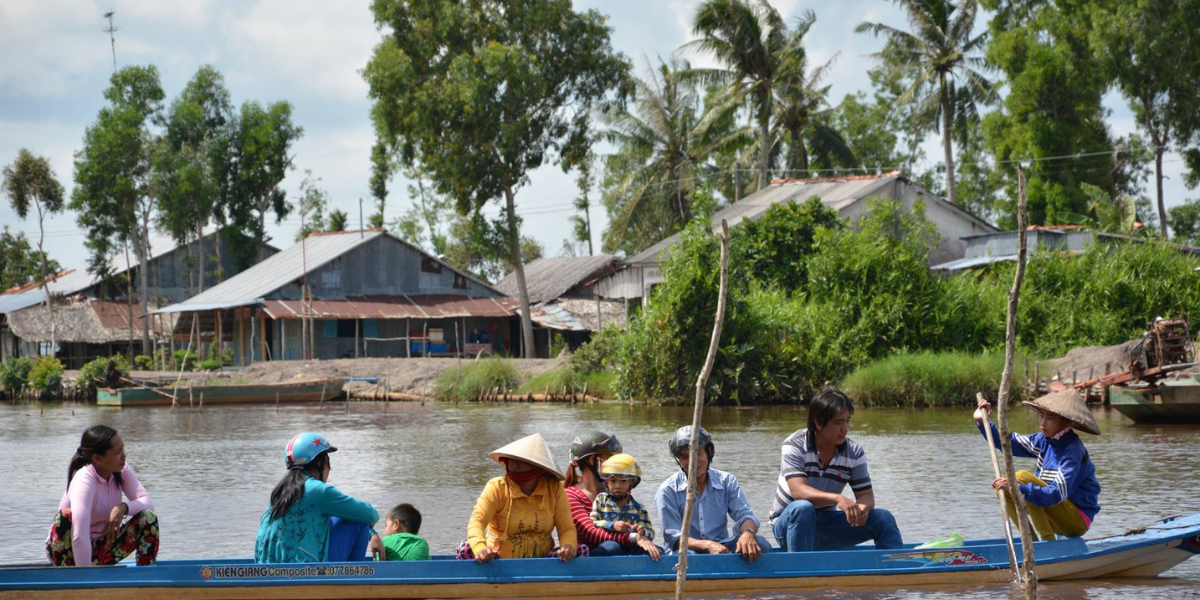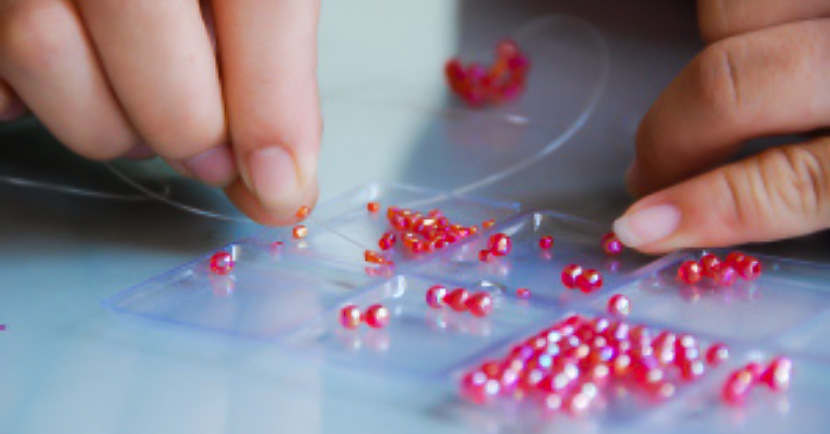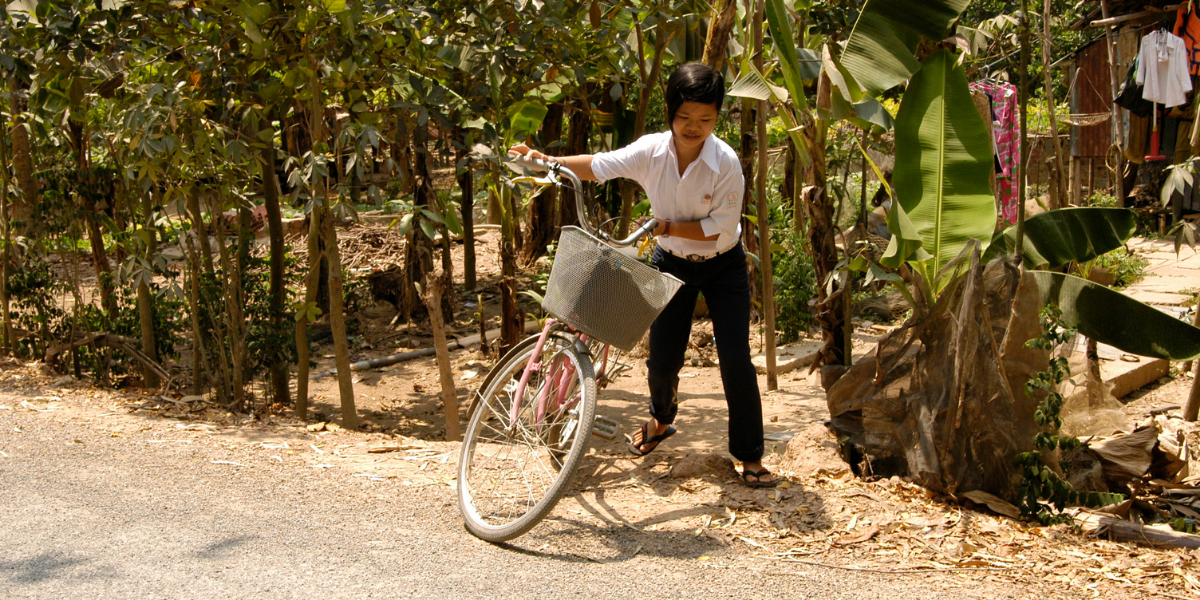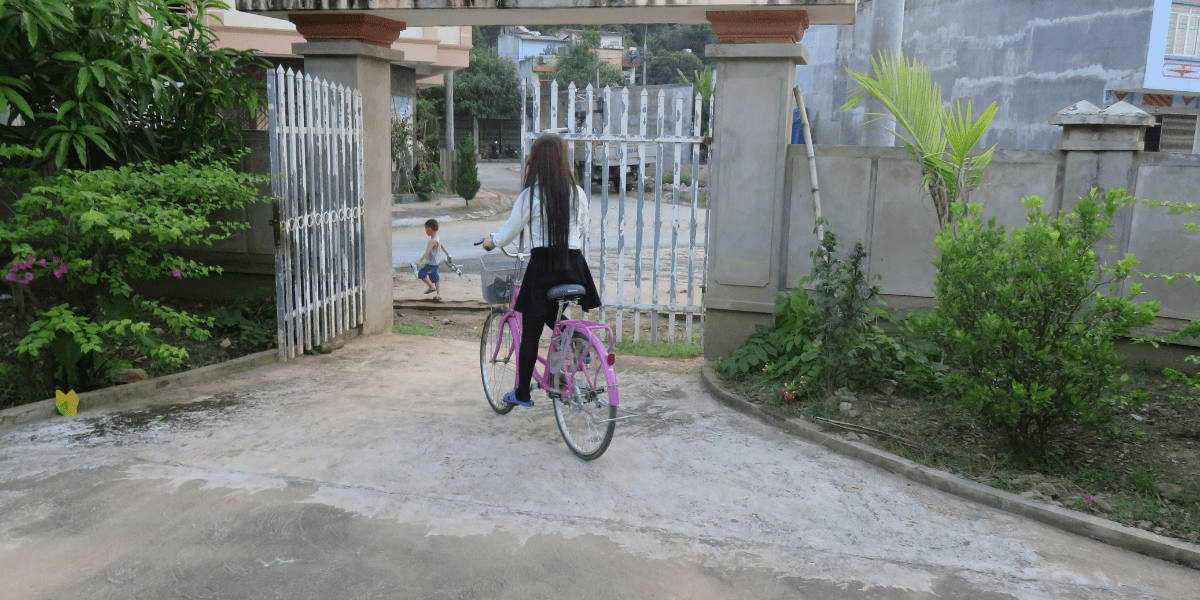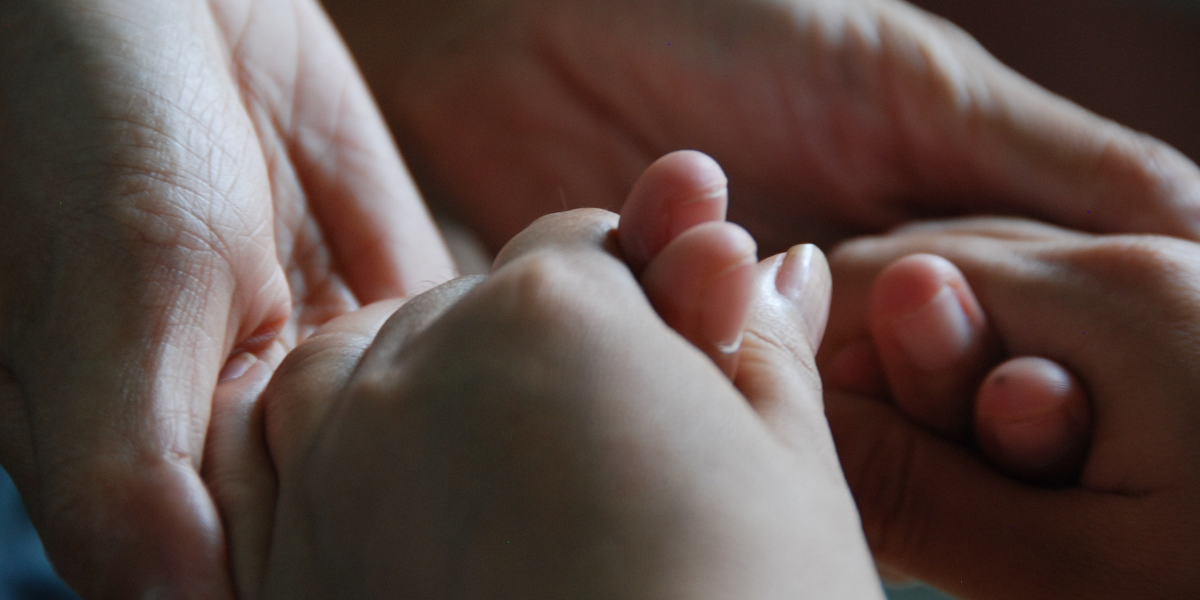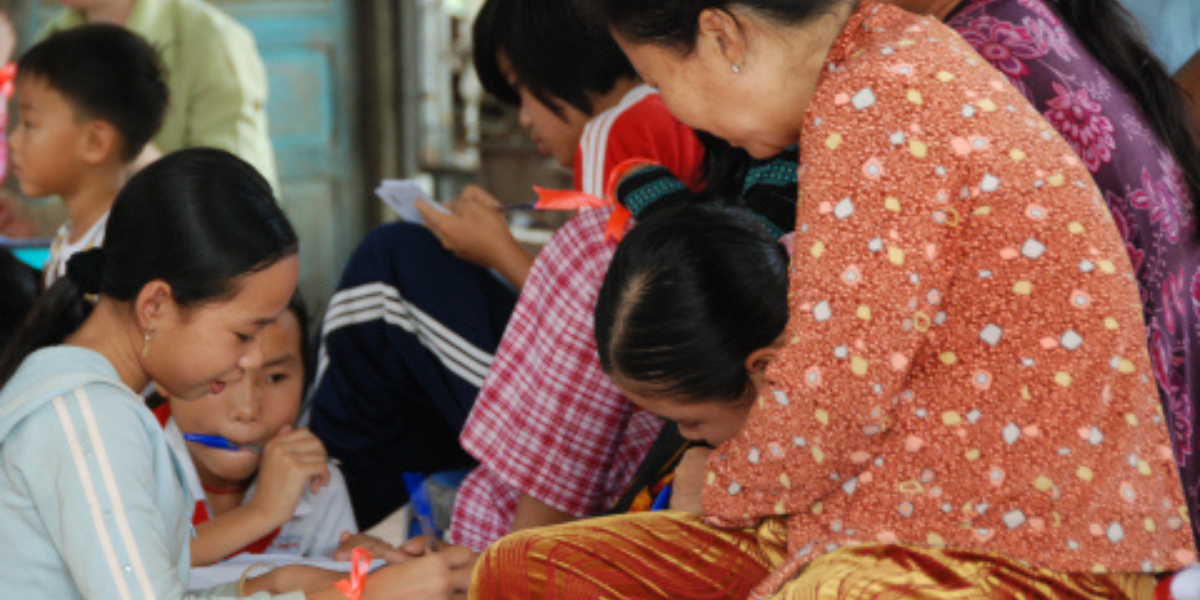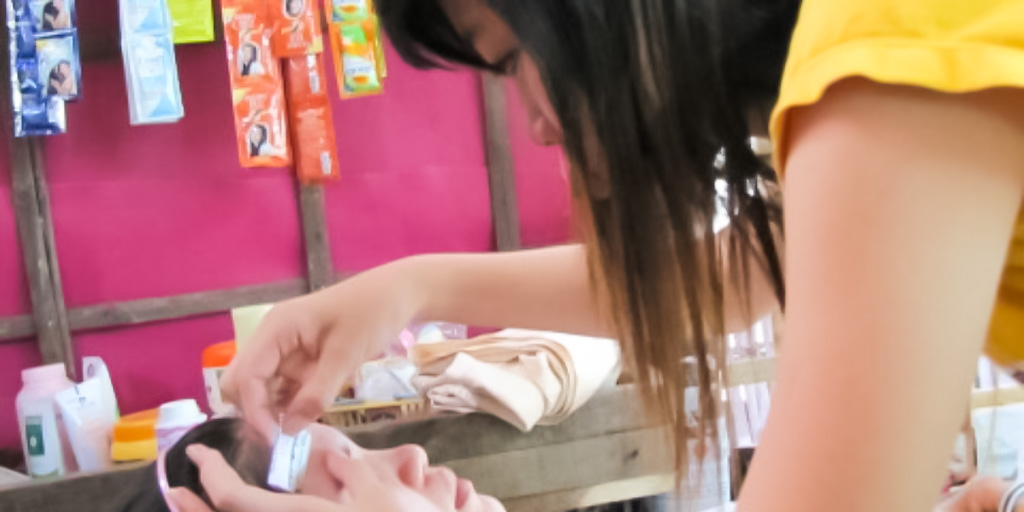Humanizing Experiences: A Mural Project on Home and Dreams
“What do you think of, when you think of home?”
“I think of our family, sitting and eating together. I think of my mom, my dad, my uncle, aunt, and brother. And I think of my brother’s laugh as we joke around during dinner.”
“What are your dreams?”
“I dream of seeing the ocean for the first time. I dream of being a really great student so I can find a job that is secure to help support my family.”
Each woman full with stories of their past shared bittersweet memories of home and what it means for them to create a new life for themselves. It is important to see the humanity of the young women we work with. It is important to empower the young women to not be defined by the stigma of what happened to them but to reclaim their past, their history, and their cultural roots to solidly pave a path for their future.
The mural project was created from just that desire, to humanize these young women. The project was developed from the belief that these women are more than just trafficked returnees, but are whole human beings who have a history, a culture, hopes, and dreams. I journeyed with the women living at Compassion House, our Reintegration Shelter in Lao Cai, for 10 days, sharing stories of home and drawing memories of the past and visions for the future.
Here is a photo journal of our process:
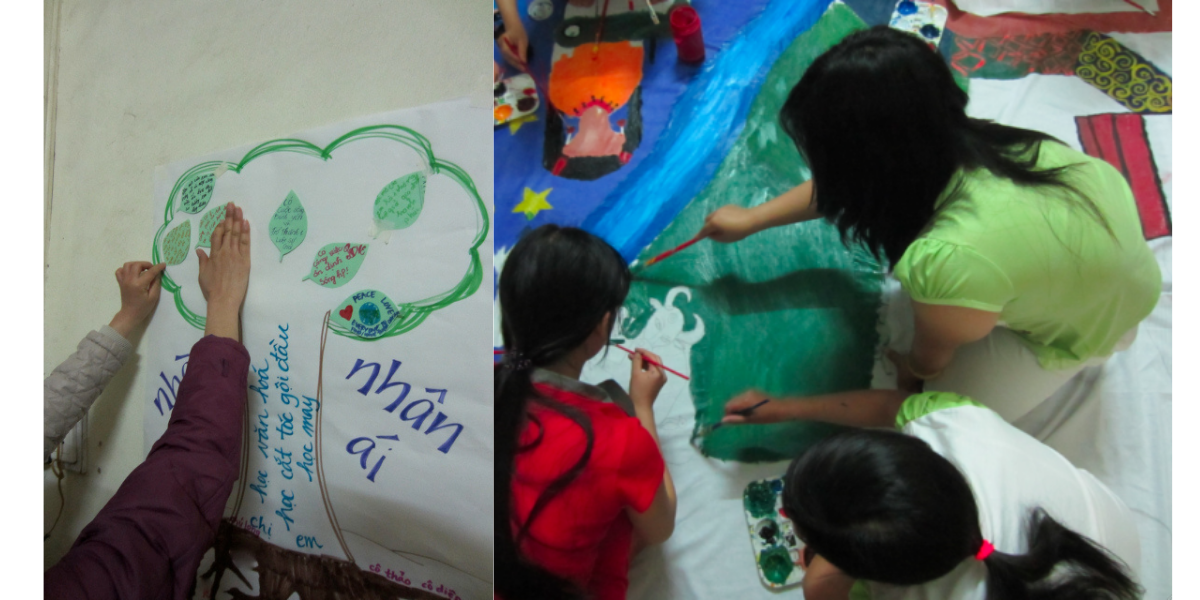
Patricia Nguyen
Business as usual: home visits to scholarship recipients
As we do every year, today we organized a team of staff members to visit the homes of the students in the scholarship program. This time the whole office went, a total of seven people, three of whom are volunteers, including one volunteer who was a recipient of our program a few years ago and has now come back to lend a hand.

We boarded An Hoa Ferry on four motorbikes, headed in the direction of Dong Thap province. This time, our team was planning to visit Phu Thanh A Middle School, Phu Ninh Middle School, Tam Nong High School, and Hong Ngu High School.
We were greeted at Phu Thanh A middle school by Teacher P. and the students in our scholarship program from this school. We split into groups so that we could follow the students back to their homes to meet their families and document their conditions – as we do every year. Everyone was hustling and smiling, calling to each other, borrowing motorbike helmets, and suggesting which students would return home first and which students would stay behind to wait for the next group. It was with this fervor and excitement that we hopped onto our bikes and hit the road, splitting off into various directions.
I was in the group that went with Teacher P., who has been assigned to help our program on behalf of the school for the past seven years. It is rare to find a teacher who is as enthusiastic as him, and who has such deep knowledge about the students’ circumstances as he does. Many of these students have dropped out of school early because of extremely difficult family situations. It has been tricky, but Teacher P. has worked with our scholarship program to encourage and support the girls to return to school. Today, when I was looking for the homes of the high school students in our program, who are no longer attending this teacher’s school anymore, he was still happy to show me the roads to each of their homes.
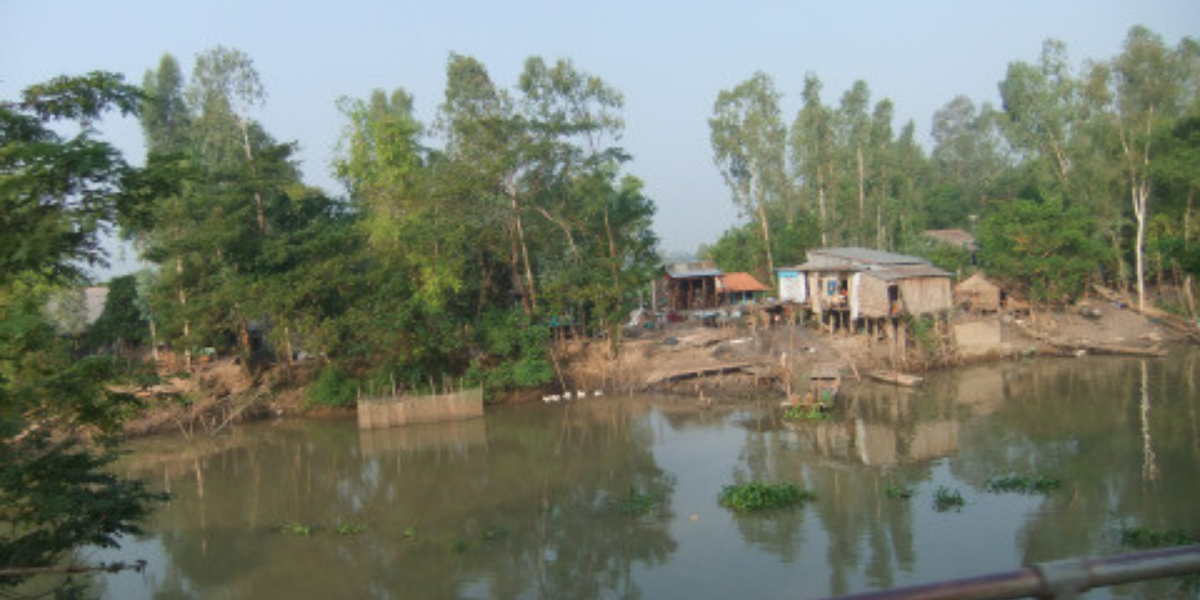
When I rode with Teacher P., I was able to learn a lot of information about the students before I got to their homes to talk to their families. Sadly, I also learned that this year, in Phu Thanh district, many families would not be celebrating the Lunar New Year because this area was one of the districts that were hit hardest by the unusually severe 2011 flood season. Many homes had sunk into the ground or had collapsed because the foundational columns sat in standing water for so long and had rotted. For people who worked the farms and fields, all of their crops had been ruined. Everything they’d planted had died and been washed away by floodwaters. Those who made a living from catching fish or picking vegetables had been tied to their homes because of the high floodwaters, and those who were day laborers waited for calls from employers that never came. On the road, I could see evidence of the things Teacher P. was telling me. There were many stretches of the road, deep in the fields, that had been eroded. In many places, the sinkage was extremely deep and the traces of the floodwater’s trails were still visible in the sand.
When we reached the home of L., an eighth-grade student who has lost both parents, her paternal grandmother said worriedly “The floods lasted so long that the foundational columns of the house turned to pulp. When will the house collapse? The debts have piled up because the water took so long to retreat”.
T., who is in the tenth grade, is also an orphan. At her home, I learned that her grandmother used to work as a hired day laborer, planting and cutting rice stalks and picking water spinach from the fields. She told me that she has been taking care of her two granddaughters since they were little girls. Her primary income comes from cleaning up the fields after harvest, gathering the leftover rice stalks, and selling them. Now that the rice fields are almost completely harvested by machines, her labor is unnecessary. In addition, the machines collect the seedling rice stalks more efficiently, so there are no leftover rice seedlings for her to gather, and the woman has lost this important source of income. But T.’s grandmother is someone who takes initiative, and so she found a new trade-in traditional medicine and acupressure. The woman told me that the work was somewhat like volunteerism: anyone with a headache, a runny nose, or sore muscles would call her and she would come to perform acupressure, steam inhalation, and other such traditional remedies for them. Those with money would give her 5,000 – 7,000 VND ($0.25 – $0.30), and for those without money, she would perform the services simply to help them.
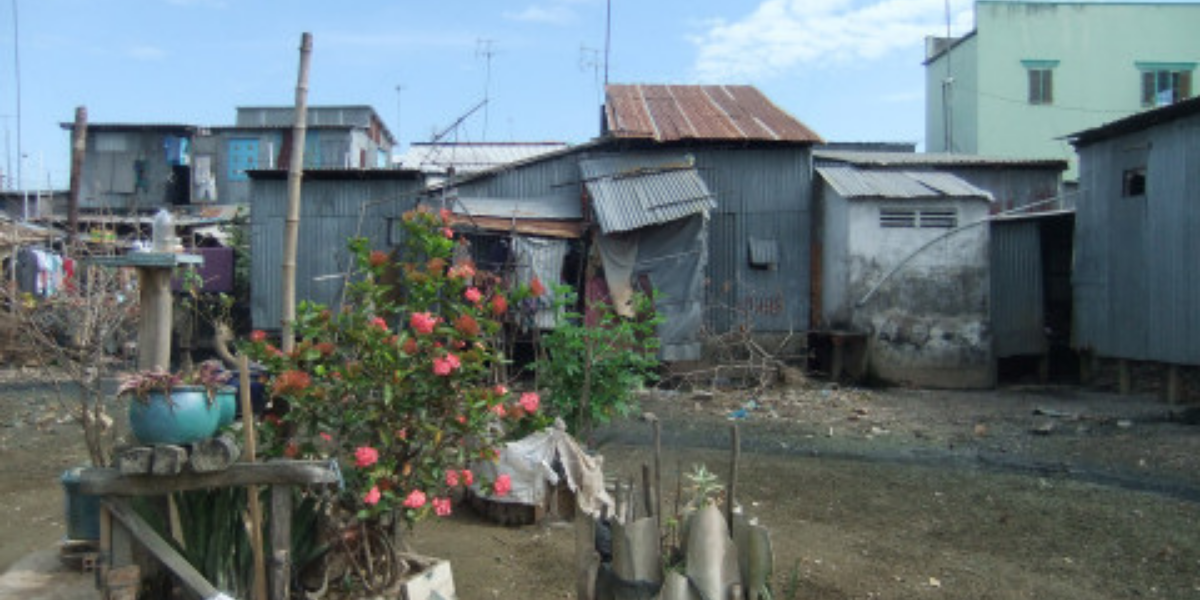
In the middle of the day, I visited the homes of two girls who had dropped out of school.
When I arrived at the home of N., a tenth grader who has lost her father and had been an excellent student for many years before she dropped out one month ago, I stopped in surprise before the door of a house that lay in shambles. It was completely different than the warm and rosy picture I had seen on the previous visits. I walked through the narrow doorway lined with weeds into a room speckled with patches of sunlight that were shining through the holes in the walls. The rays of sunlight danced on the small table that had been N.’s study table, where there were still piles of neatly stacked schoolbooks and notebooks with N.’s handwriting. The table looked lonely today, so different from the lively picture I’d seen on previous visits because today I wasn’t greeted by N.’s gentle smile. On a bamboo bed across from me, N.’s maternal grandmother lay staring blankly at the floor. She has some form of severe eczema, and her entire body was covered in peeling patches of white and red skin. N.’s little sister was sitting at the head of the bed, staring at me. It was noon, but the kitchen was cold and the two women, one young and one old, sat silently like stones. N.’s grandmother said that her grandfather had been in the hospital constantly, and the family was in extreme hardship. As the only wage earner, N.’s mother couldn’t make ends meet, and had decided to take N. out of school so that she could become an apprentice at a beautician’s shop in town, to help take care of the grandparents and her little sister. I demanded many times, an angry tone in my voice, “Why did our scholarship program help N. so much, only to have you take her out of school so easily? What happened to the commitment you had to keep your daughter in school through the twelfth grade?”
I stopped by the market, following the tip that N. was studying to be a beautician at “Tien” hair salon. I paced back and forth in the tiny countryside market that had only four or five salons before I discovered a tiny shop at the back of the market with a big “Kim Tuyen” sign. When I got a little closer, it was easy to recognize N. behind the store, shampooing a customer next to another girl. She stood out among the other girls with their thick makeup and red-dyed hair because of her beautiful simplicity. I noticed the strands of her long black hair tied back in a ponytail, and I noticed her two cheeks flushed from working in the afternoon sun. It was so different than the pale expression I’d seen before when Ms. Kieu Nhi, a former Program Director, helped her go to Ho Chi Minh City for a heart operation. I went into the store and asked for a shampoo, pointing to N. and saying that she was the one I wanted to wash my hair.
After that N.’s story became clearer. I found out that she had cried many times in order to arrive at this decision. Her grandparents were sick all the time. Because her home was so far from school, she had to ask a friend to take her by motorbike but had been unable to come up with the gas money. Her mother had worked at a garment factory 7 kilometers from their home for the past five months but hadn’t yet received a penny of salary. She told me she had to go to work in order to help keep her younger sister in school!

Although it’s been seven years since I started working with Pacific Links Foundation, it seems like it was just yesterday. I see these students several times each year, but I’m always surprised at how much they have changed and grown. One day they are little girls in elementary and middle school, but when I turn my eyes away for just a second, I turn back to see that they have become teenagers. From my perspective, the time has flown by, but I wonder whether the time has flown for these girls, who are doing their best to take care of their parents, their grandparents, and their younger siblings, going without basic needs and striving to survive hand to mouth. How many times have they had to come face to face with the natural uncertainties of life? They are just young girls. What secret dreams do they have that they could never dare to utter aloud? Do they feel angry or depressed because their parents aren’t able to take care of them, or thirst for the little things that girls their age in the city have in abundance?
Nguyen Thi Phuong Thao, Translated by Lillian Forsyth
This is a memory I am making
There is a Pacific Links Foundation’s reintegration shelter at the northern border of Vietnam for trafficking survivors. A twenty-minute walk from the shelter will lead to a path where one can see, across the river, to China. Here, on this side of the border, the shelter girls were children, they worked in the fields with their parents, they believed the trusted family friend who said they would be paid to be dishwashers and restaurant workers and cinnamon dryers. There, on the other side of the border, they were still children when they were instead sold to be wives and prostitutes.
This is a memory I am making.
After lunch, one day, one of the Pacific Links Foundation staff members passes out the homemade yogurt she had made the night before. For most of the girls, it is the first or second time they have ever eaten yogurt. I sit squeezed between five other girls on the couch, each of us balancing our glasses on our knees. After I finish off my yogurt, I glance over to see the girl next to me dipping her spoon straight up and down into the silky yogurt. I ask her, laughing, why she’s eating in such an odd fashion, and she replies wistfully, “Because I don’t want it to be gone so quickly.” After everyone has finished up and washed their glasses, she is still licking a few drops of yogurt at a time from her spoon, relishing the sweetness.
This is a memory I am.
I spend much of my last few days at the shelter beading with the girls. We sprawl around the large conference table, loose beads scattered across the table- aqua blue and chive green and pearly white and cotton candy pink- and squint, with pursed lips, trying to stab the end of a plastic string through the tiny holes. This requires much patience, this slipping of one bead after another. We sit in a circle, and sometimes the girls sing, in Hmong or Vietnamese, their voices high and slightly off-key and haunting. Sometimes I ask them questions about their family or their villages, and they tell me about how they would play make-believe when they were younger, imagining whole meals out of mud and leaves and rocks. Sometimes, we just sit in silence, and if I look up across the table and catch a girl’s eye, smiling, she smiles widely back, and then we go back to our own beading. And in the midst of that quiet, that gentle slowing of time, there is nothing more than that moment, nothing remaining except to listen to young girls sing of love and loss, their hearts breaking in their mouths, and to bead these pearls one at a time onto a string I will carry with me always.
This is a memory.
Sitting around a circle, we share affirmations of our strengths. One of the girls remains in silence for several minutes when it comes to her turn; she can’t come up with anything positive to say about herself. Last year, she had been sold so far across the border of China that, after she escaped, she had to be flown back to Vietnam. She told me that, as she was running away from her captors, in the middle of the night, she would run close to the cliffs of the surrounding waterfalls, so that, if they found her, she could kill herself by jumping off the edge. She whispers her one positive trait to a nearby girl, but we ask her to say it aloud using her own voice. When she finally does, a barely audible, “Sometimes I try to help people,” her voice breaks, under the strain, the newness of what it means to believe that it is good in her.
This is.
A girl asks me, “Do you remember the last time you visited, one day there was a double rainbow?”
I say, “I do.”
“It was so pretty, wasn’t it?”
I agree that it was indeed. We both look out at the cloudless blue sky, her hair lit up by the sun. There is no rainbows insight, but it is still a sight to behold.
Nhu Tien Lu
For a bag of coffee
In the United States, a bag of name-brand coffee will cost about $12. In Ho Chi Minh City, it costs 35,000 Dong ($1.75 USD) to order a Vietnamese iced coffee in an air-conditioned upscale café, or 10,000 Dong (50 cents) to have your coffee in a disposable cup instead of from a vendor in the park.
Here, in this urban chaos of business and motorbikes, you will sometimes meet someone, either a foreigner or Vietnamese, and he will ask you what you do. In response to your saying that you work on anti-trafficking along the borders of Vietnam, he will say knowingly, “Yes, I hear so many of these poor parents sell their own children for a few dollars, or a bag of coffee or something.”
You will respond with, “Actually, from our experiences with trafficking returnees, the girls are most often tricked by acquaintances of the family, or perhaps even a relative, usually because the girls were looking for a job. The parents often don’t have enough money to send their children to school, so their children will often quit school early and try to find work to help out, which leaves them vulnerable to being tricked and sold.”
Usually, this person will nod absent-mindedly, look away, and then change the topic.
What you don’t get to say is, “What kind of parent do you think being poor makes you?”

It costs 150,000 Dong ($7.50) one-way for a seat in an 18-person van that will end up crowding in 24 people for a 9-hour bumpy ride from Ho Chi Minh to Kien Giang. On that ride, the window won’t be able to close, the door will jam and no longer open, the man perched on the child’s plastic chair next to you will keep falling asleep on your shoulder, so that you have to push him off at the same time that you are slapping the mosquitoes from your feet, and someone behind you will become carsick several times during the trip. But once you step out of the van, the landscape stretches out around you in bright shocks of green rice paddies, trees of ripening papaya, tangled dragon fruit branches, and everywhere, the presence of water, in the brown rivers of the Mekong and the still, clear pools of farmed shrimp.
In this borderland province, for a family of 4, where the mother and father have hired hands, renting themselves out for work in other people’s fields and attempting the risky business of raising shrimp (risky, because a shrimp virus can wipe out an entire season’s earnings, as well as poison the pond for several successive seasons), they will take home about 150,000 Dong ($7.50) a month, or 5000 Dong (25 cents) a day, after their land rent is deducted. Whatever they can plant and forage for around their house, built from dirt and water-palm leaves, is what they will eat. They will occasionally splurge to buy ice.
For their two daughters to attend school, they must consider how to pay for the school fees, facility expenses (such as building maintenance), uniforms, textbooks, and school supplies on 25 cents a day. They also must factor in the loss of income if they allow their children to continue their education instead of having them sell lottery tickets or help in the fields. They must weigh their daughters’ tearful pleadings to attend school, and their quiet, desperate love for their children, desperate beyond the short-term logic of their finances. They must balance what school means as an investment in their children’s future, decades in the distance when they are sometimes uncertain what the next few months will look like from the shallow bottom of a rice bowl.
You ask her, “If our program runs out of money, and we can no longer provide a scholarship for you to attend school, do you think your parents will try to help you finish 12th grade?” She is in 8th grade and wants to be a doctor. She cries when she says this. She shares a bicycle with her 11-year old sister, biking to school for her morning session classes, and then coming home at noon so that her sister can take the bicycle to attend her afternoon session. Between the two of them, they also share 22 certificates of achievements that they can’t hang up on their walls, for fear that the rains that pour through the gaps in the water-palm leaves will ruin the papers. She answers, “Yes, if my parents are able to.”
“And what if they’re not able to?”
She looks at you, wanting to answer, wanting to please you, but nothing comes out, and tears well up in her eyes. She puts her head down and whispers, “I don’t know.”
There is a child’s love that can sound like honor and duty, that can look like quitting school and working with fingertips black from picking peppers for several cents a kilogram, that can feel like a letting go of dreams that can’t be dreamed, that can taste like a tender, bittersweet pain.
There is a parent’s love that can sound like sacrifice and responsibility, that can look like bent-over fieldwork from before sunrise to after sunset, skin dark and calloused, this caring for one’s children that can feel like a burden of lightness, a deep, unspoken longing for them to have a life that is better, gentler than your own, this painful sorrow so sharp it can taste like hope.
Along the roads back from Kien Giang, passing next to rows of farmed shrimp pools, you can see, reflected in the still waters, the deepening blue of the sky. Above and below you, there is nothing but sky.
Pacific Links Foundation scholarships cost $200 for one student’s educational expenses for a year. We currently provide scholarships for 384 at-risk girls annually, with the goal of providing scholarships to 1000 girls annually by 2014. You can help by sponsoring one or multiple scholarships to enable at-risk girls to continue attending school.
Nhu Tien Lu
The stories of a girl
For the past three weeks, I’ve been living and working at Pacific Links Foundation’s reintegration shelter for trafficking survivors in northern Vietnam. There are twelve girls, ages thirteen to twenty-two, from five different minority ethnicities, currently residing there. When I boarded the flight back to Saigon, my legs were scarred with flea bites from the rural visits, my bags were heavy with miniature pineapples and northern plums, and I was weighted with stories, these girls’ stories whose wings I can feel urgently fluttering against my ribcage, trying to find their way out.

A path through stone corn to her house.
In northern Vietnam, about an hour’s drive from Lao Cai and a steep fifteen-minute walk along dense rows of stone corn and narrow ledges of rice paddies live a Hmong girl. She is thirteen, which is old enough to have worked in the fields since her first memory, old enough to be snatched off for marriage, old enough to be sold with her mother and two sisters to China.
There are details about those four months spent in China that she will have to relive and retell over and over. These are the answers that she will have to recount to the police, the immigration officials, the social workers, the researchers, and to story seekers like myself.
I was born in the year of the mouse.
In my family, I have my mom and dad, two sisters and two brothers, and a nephew we’re caring for since his mother was sold last year to China.
My uncle invited my mom and sisters on a holiday and he promised to pay for everything. So we went with him by car, and then by boat, and then again by car once we arrived in China.
I knew that we had been sold when my uncle took the money and the two men who had taken us by boat said that we could no longer go home.
I lived with my mom and younger sister for two months, then I was sold for 12,000 yuan ($856 USD) to become the wife to a thirty-year-old man. The family cursed at me frequently in Chinese, but I could understand, even if I didn’t know all the words. They tried to force me to learn Chinese, but I would resist; I would purposefully not listen or pay attention. They told me that they couldn’t afford to pay for a wedding with a Chinese woman for their son, so they bought a Vietnamese girl instead. I went to work with them in the fields and did housework. My older sister lived nearby since she had been sold to another man in the same neighborhood, and we would call each other as often as we could and cry together.
After four months there, I escaped with my older sister and we hired a taxi to take us to the police station, lying to the driver that we had to fill out some paperwork there because we were afraid he would bring us back to our husbands if he knew we were running away. We spent a total of two days at the border police station, two weeks at the Vietnam migration shelter, and then we were home for 4 days before we arrived at the Pacific Links reintegration shelter.
Then there are the details that she is not asked about, those memories that don’t make it into the notebooks of policemen or policy research interviewers.
I have fond memories of New Year’s day when my dad would celebrate by buying a few cans of soda to place on the altar, and after the spirits had drunk, we could bring them down and drink them.
 She washes chopsticks in preparation for lunch during our visit, her white plastic shoes in the background.
She washes chopsticks in preparation for lunch during our visit, her white plastic shoes in the background.My parents bought my first pair of shoes for school, little plastic ones that cost 5000 Dong (25 cents US) and I’d walk barefoot to school, then put the shoes on, and then after school, I’d walk back home barefoot. I was so afraid of wearing down those shoes.
I had a baby chick when I was young, but one day it was hopping around the house, crying -chirp chirp chirp- and my sister, who was sweeping the dirt floor, became irritated at the noise, and so she brushed it out into the field and it died. It was so small. I cried and cried.
When I was supposed to be tending to the water buffalos after school, if my parents weren’t around, I would shape the damp red earth into figurines, and pretend that my clay was a princess who lived in a castle, and I could do this for hours -meanwhile having to slap away the fleas that landed thick and dark on my legs- and if my sisters were with me, then my princess could go visit their princess in their castle.
In China, the family would turn off the television at 11 pm, and I would go upstairs to my bed and sit there, awake, still, until 3 or 4 in the morning. I would think about how to escape. I would think about killing myself. Sometimes I just thought. I would ask my sister, when life and death are the same misery, then what’s the difference? But I once overheard the family talking about a dumb girl who escaped back to Vietnam, and I thought if she’s a stupid girl and she managed to run away, then how ridiculous would it be if I couldn’t? And after that, I stopped thinking about suicide and only thought of how to escape.
She is now planning on finishing her schooling while at the shelter. When asked what she wants to study, she says, anything. Everything. She is so clever that you believe her, you think everything is truly possible for her if she should want it. Her laughter is open, wide, infectiously bright, so deep that you can’t imagine her sadness.
She says: “I dream of one day owning a house with two stories. Of having a lot of money so I can buy whatever I want. Of going swimming in the ocean.”
Anything else?
She looks down, and then she says, softly: “I dream that one day I’ll forget.”
And then she begins to cry, this vibrant, shining girl who has, for the first time since you’ve met her, stopped smiling. You wrap her in a hug and you hold her for several minutes while she cries, although you can’t tell who’s crying harder.
And in a while, she’ll dry her eyes and you’ll say something to make her smile, and when she does, her wide, deep laugh bright as a morning in the room, you’ll see how her laughter is fierce with courage and resistance and light.
But for now, you let her cry, her thin shoulders against your arms.
There is a thirteen-year-old Hmong girl you now know, and whose story you will tell to others, who laughs all the time, who cried over baby chicks and refused to learn Chinese, and who dreams of one-day forgetting.
Nhu Tien Lu
Not famous, but heroes nonetheless: reflections on the 2011 trafficking in persons report
On June 27, the U.S. Department of State released the 2011 Trafficking in Persons (TIP) report, which assesses the counter-human trafficking efforts of 184 countries and provides recommendations for improvement. Although it can’t fully investigate the complicated nature of the issue in each country and is, after all, written with the U.S.’s diplomatic policies in mind, this annual report is one of the main sources of standardized information about trafficking in the world.
Vietnam was listed as “Tier 2 – Watchlist” again this year. The Vietnam section of the report pointed primarily to Vietnam’s labor trafficking problem and encouraged Vietnam to make information and protections more readily available for private and state-run labor export companies. I was frustrated by the shortage of information about sex trafficking, as this is still a pressing issue in the regions where Pacific Links Foundation works, and it is inextricably linked to the rise in labor export from Vietnam.
One of the victim stories from the TIP report highlighted the link between labor trafficking and sex trafficking that is often observed in Vietnam:
“Olga, 23, came to Dubai from Moldova on a visitor visa after hearing about a job opportunity there. A Russian woman and an Indian man picked her up at the airport when she arrived. They took her to their apartment and told her she would instead be prostituted. When she refused, they beat her and threatened to kill her and bury her in the desert. They threatened to harm her if she did not pay them back for her travel expenses, and then sent Olga to a local hotel to meet customers and collect money from them.”
U.S. Secretary of State Hilary Rodham Clinton spoke at the White House on the day the report was released, reiterating some of the key points and talking about her own experience visiting a shelter for young trafficking victims in Cambodia.
This year’s report also contained a section that I’d never noticed in prior years, entitled “TIP Heroes.” Clinton mentioned this section of the report in the speech, stating:
“Stories like these and the others you will hear about our TIP heroes give us hope, because they inspire us, but also tell us very practically what we can do to make a difference. And the story of all the victims really is one that should motivate all of us. And when we hear the stories of the TIP heroes, we know that it’s not hopeless, we know that it is not overwhelming, we know that person by person, we can make a difference.”
The Secretary’s words made me curious about these TIP Heroes and so I navigated over to that section of the website. As I read through these heroes’ stories – people working on trafficking from Bosnia, to Nepal, to Finland, in areas including prosecution, shelter services, and community building – I felt a simultaneous sense of “So what?” and “Wow.” How could these two thoughts occur simultaneously? Well, because as I read through the stories of these heroes, I felt as if reflections of the Pacific Links Foundation’s counter-trafficking initiatives were staring out of the page in front of me.
The TIP Heroes showcased in the report are people who have trained law enforcement officials to recognize trafficking at the borders, set up programs to counter trafficking in their communities, and established shelters for victims where there were previously no services. Pacific Links has done all of these things and more. Pacific Links Foundation has provided over 700 scholarships for at-risk girls; reintegration services to more than 80 young women at its shelters at the northern and southern borders or in their communities; and awareness-raising programs for over 5000 local school teachers, women’s groups, public officials, parents, and community members. And Pacific Links Foundation does all of this with only two full-time program staff members, one accountant, two resident coordinators at the shelters, and a handful of unpaid full- and part-time volunteers, in both Vietnam and the U.S., including the organization’s president.
As I read the TIP report stories, I felt a sense of admiration for what Pacific Links Foundation has been able to accomplish over the past six years. It’s amazing to be able to work for an organization that is full of everyday heroes who dedicate so much of their passion to this cause and but have yet to receive such formal recognition.
Lillian Forsyth
A trip to the border region
Since March I have been working with Pacific Links Foundation to prevent human trafficking in Vietnam’s remote border regions. While my primary role is communications, networking, and fundraising for the program in Ho Chi Minh City, I recently had the opportunity to participate in the organization’s yearly Parent’s Day in each of the border provinces where we provide scholarships to at-risk girls. I have spent the better part of the last five years in Vietnam. But this was a level of exposure I had yet to experience.
We were on the road by 6 a.m., the fresh morning air rushing in through the windows of a rickety 14-passenger van as we crossed our first ferry of the day. Dong Thap province, on the opposite side of the river, is one of the poorest provinces in the Mekong Delta region, with a high rate of trafficking and migration across the long border with Cambodia. After three hours on barely paved roads and a second ferry crossing, we reached our first middle school of the day and climbed the stairs to a room full of bright-eyed young girls, ages 12 – 16. Their mothers, fathers, uncles, aunts, grandparents, and other caretakers sat on narrow wooden benches at the opposite side of the classroom, wearing polyester pajamas and weary expressions.
I was most nervous about the interviews. Annual Parent’s Day activities have two purposes: raising awareness about human trafficking, and providing Pacific Links Foundation staff the opportunity to speak with each family about their economic situation and evaluate how it is affecting their daughters’ risk of being trafficked. With a shortage of staff, I was tasked with interviewing some of the families.
My first interview was with Ms. Dao and her daughter Men (names changed). While I spoke with Ms. Dao about the family’s situation and how it had changed over the past year, Men wrote down each of the members of her family and her address on an interview form. Her mother dropped out of school after third grade and can’t read or write. This year has been tough, Ms. Dao confided: with more and more farmers moving to mechanical rice cutting techniques, day laborers such as herself have fewer sources of income. She has resorted to taking in laundry to support Men, Men’s 3-year old brother, and Ms. Dao’s older sister, who is too ill to work. With this, she’s able to scrape together 200,000 – 300,000 VND per month—the equivalent of $10 – $15 U.S. Dollars. When I asked her what her hopes were for her daughter’s education, her eyes began to tear. “I want her to study as far as she can. I don’t want her to end up like her mother.”
The typical story that you hear in the news and in the papers here is that people in the Mekong Delta simply sell their daughters as a way to help the family’s economic situation. Looking into the faces of these parents and their daughters confirmed for me that this is simply a myth bred by those who fail to understand the complicated nature of the poverty that exists in the remote parts of this country. What parent would ever willingly sell her child into prostitution, labor exploitation, or other danger? But presented with an attractive but false opportunity by a trafficker who may be a neighbor or even an extended family member, what parent wouldn’t agree to provide her daughter with what seems like a better future in another place, be it in another country? This is one type of manipulation that allows human traffickers to prevail. Hearing the scholarship recipients and their families recount the information they have learned from Pacific Links Foundation about how to keep themselves safe from this risk, I could see concrete ways that the organization is making an impact.
At the end of the week, I found myself on a comfortable air-conditioned bus back to the city. As we approached, the neon lights and the urban bustle surrounded us, and I was once again sucked into the increasingly cosmopolitan world of prosperity that is Saigon. That Friday night, I was able to collapse into my own bed for the first time in ten days. But for some reason, I was unable to sleep. I tossed and turned until nearly two in the morning, cursing the fact that I would arrive for class the next day looking and feeling as if I’d had a wild night out on the town. Every time I closed my eyes, I saw the faces and heard the stories of Ms. Dao, her daughter Men, and each of the other girls and parents I spoke to during the interviews. The next morning brought a return to the normal routine, but my brain has been effectively detached from my actions for the past 5 days. Perhaps this is simply a new and more profound kind of mental disconnect that I will have to overcome if I am to continue this work of bridging the ever-widening gap between the organization’s donors and the people we serve.
Lillian Forsyth
Year-end accomplishment
Our troop of 15 women was loaded into a van for a 3-hour bumpy trip, crossing one scarily small ferry for a GRAND opening of a beauty “salon” on an auspicious day. We know it was an auspicious day because while it was Thursday, there were at least five weddings that we saw on the way. At one point, the road was so narrow that a wedding party took over the entire road, and the only way to pass was to lift up the entire awning.
N.M.’s mother was in tears to see all of us celebrate the new enterprise, saying that “your presence removes all the doubts and rumors around here that my girl was a ‘bad’ girl, and held by police for doing illegal things… I am so proud today. All of my children, not just my N.M., can face people around here.” N.M. had resided for more than 12 months in PALS’ Long Xuyen Open House where she attended beauty school. Her certificates, with her pictures, were plastered on the wall, mixing with the Honor Certificate for Best Students that her younger sister consistently received over the years. We have placed N.M.‘s sister in our scholarship program as well. She is currently attending 6th grade.
Two chairs + 1 hair washing recliner and nonstop customers. An auspicious day indeed. A new home will be erected for her family in the next few months, right behind the extension that currently houses her shop, giving more space to the family.
The Open House resident coordinator cannot stop smiling. She had even ordered the shop’s signs from Long Xuyen the week prior. Coordinating with IOM who provided the main funding, we assisted N.M. in opening her first beauty salon, which provides various beauty services such as nail, hair styling, and cutting, facials, etc. N.M. is now an accomplished beautician.
We are proud of you N.M.!
Pacific Links Foundation Team
